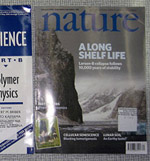Shifting baselines: how quickly we forget about declining species
 Freshwater
Freshwater Catching gigantic, river-dwelling fish that grew as long as 22 feet might seem like fodder for unforgettable fish tales that would be passed down for decades or centuries, even after the species went extinct. Not so, according to a recent study conducted along China’s Yangtze River.
The study demonstrated that human society has a surprisingly short collective memory of past ecological conditions. This “community amnesia” results in the shifting baseline syndrome, in which people misperceive ecological health and the magnitude of ecosystem changes because they lack awareness of species diversity and abundance in the recent past. Because of its influence on conservation and management, the shifting baseline syndrome has been discussed widely, but this study is one of few to explore the human aspects of the phenomenon.
Samuel Turvey and several collaborators interviewed fishermen and other local people who live along the Yangtze River. Over 70 percent of those under the age of 40 had never even heard of the gigantic fish in question—the Yangtze paddlefish, which was commonly sold in fish markets well into the twentieth century and probably went extinct within the last 10 years.
Interviewees of all ages were aware of the overall decline of the Yangtze River ecosystem. Older fishermen, however, were more likely to recognize declines in two commercially important fish species, Reeves’ shad and Yangtze pufferfish. Older fishermen were also more likely to have knowledge of the paddlefish and the Yangtze River dolphin, which also probably went extinct in the last decade.
The shifting baseline syndrome has major implications for conservation. Often scientific data on species only extends back to the recent past or is missing all together. So frequently we have to rely on our collective memories to figure out baseline conditions. However, if societies are as forgetful as the results from this study suggest, then we may be severely underestimating the baseline level of ecological health.
Turvey and his colleagues assert that insufficient communication is responsible for the remarkably fast loss of “community memory” about the ecosystem. The older fishermen had personally encountered the paddlefish and dolphin, and they had lived through the declines of shad and pufferfish. The younger ones lacked these direct experiences and because of insufficient knowledge transfer from the older to younger generations, the community memory faded dramatically within a human lifespan.
The findings raise questions about relying solely on local, traditional knowledge—rather than direct scientific observations—as a source of information about ecological conditions. As the authors note, “once even megafaunal species cease to be encountered on a fairly regular basis, they are rapidly forgotten by local communities.”
--Reviewed by Peter Taylor
TURVEY, S., BARRETT, L., YUJIANG, H., LEI, Z., XINQIAO, Z., XIANYAN, W., YADONG, H., KAIYA, Z., HART, T., & DING, W. (2010). Rapidly Shifting Baselines in Yangtze Fishing Communities and Local Memory of Extinct Species Conservation Biology DOI: 10.1111/j.1523-1739.2009.01395.x




Reader Comments